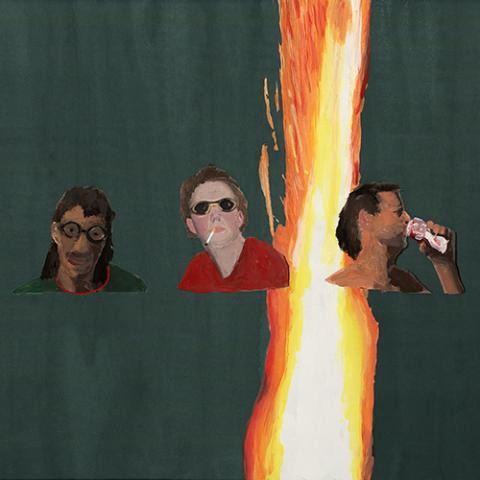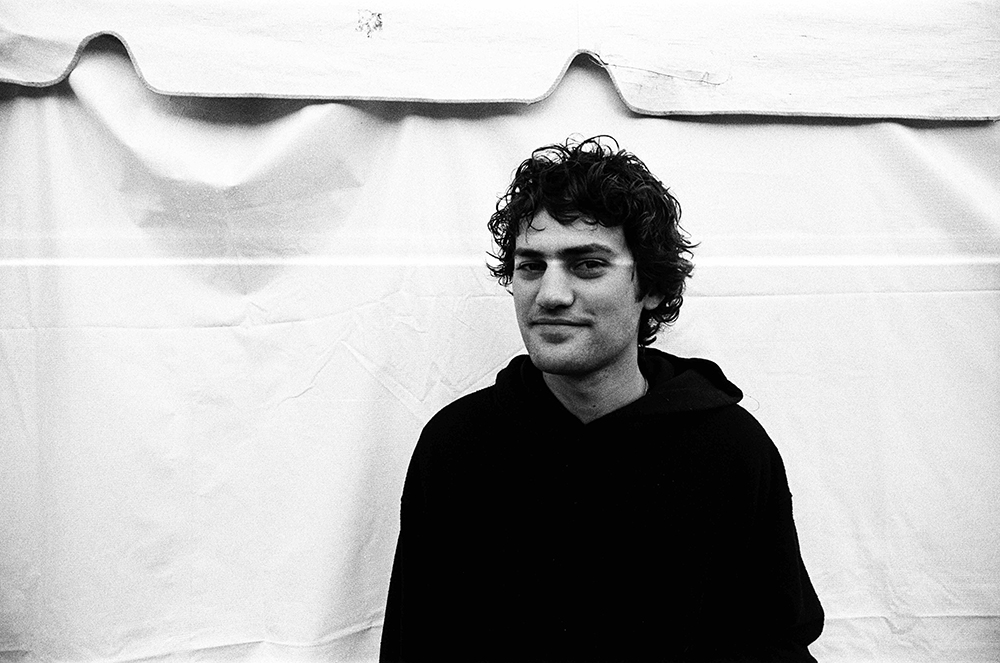
In the Catholic storytelling style reminiscent of Flannery O'Connor and Bruce Springsteen, MJ Lenderman leaves it up to the audience to decide whether his flawed characters are likely to be redeemed. (Karly Hartzman)
Somewhere around the fifth time I listened to MJ Lenderman's new album, "Manning Fireworks," I found myself thinking about Flannery O'Connor. (The first three or four times I listened to it, all I thought about was how great the guitar sounded, and how funny the lyrics were.)
O'Connor claims her stories are, "for the most part, about people who are poor, who are afflicted in both mind and body, who have little—or at best a distorted—sense of spiritual purpose, and whose actions do not apparently give the reader a great assurance of the joy of life." This is an apt description of the characters populating "Manning Fireworks" — drunks, gamblers, philanderers, posturing religious hypocrites; the sort of people who, in the title track, handle fireworks next to a bonfire.
But the thing is, Lenderman, like O'Connor, is hilarious. The portraits are often bleak, but the audience comes away with a sense of joy.
O'Connor and Lenderman share another quality in their storytelling: a reliance on Catholic imagery. "Joker Lips," the second song on Lenderman's album, includes the line, "Every Catholic knows he could've been pope," and the narrator of the next track, "Rudolph," claims, "I wouldn't be in the seminary if I could be with you."
Advertisement
Over the nine tracks, Lenderman touches on Noah's ark, speaking in tongues, performatively reading the Bible in public and the hymn "Amazing Grace." The refrain of the penultimate song is "Wherever you find me/ You'll find me on my knees" (the posture is deliberately ambiguous, but given the religious imagery throughout the album, the idea of prayer is inevitable here), and I'm willing to bet "Manning Fireworks" is the only album named "Best New Music" by Pitchfork to reference original sin in the title track.
So, yes, the religious language jumped out at me. I quickly verified that Lenderman did indeed grow up Catholic, and attended a Catholic elementary school. He told Will Hermes of The New York Times that the church was "basically our whole lives, until we all got confirmed." He considered the priesthood for a while (his second album includes a song called "Catholic Priest," about his own youthful notions of a vocational calling), and acknowledges that a Catholic sense of guilt informs his worldview; as he told Jordan Bassett at New Musical Express, "I think there's a part of every person who's grown up Catholic that feels like maybe they've done something wrong."
But while Lenderman uses religious language throughout, this is not an album about spiritual longing in the mode of fellow indie darlings Sufjan Stevens or Julien Baker. His songs are more interested in depicting a certain type of (broken) person in a specific place and time. It is up to the audience to determine if redemption is on offer here.

MJ Lenderman's latest album, "Manning Fireworks," was released on Sept. 6, 2024 by ANTI-records. (Courtesy of Pitch Perfect PR)
Lenderman first came to my attention for his work on Waxahatchee's 2024 album "Tigers Blood," where he plays guitar and duets with lead singer Katie Crutchfield, most memorably on the single "Right Back To It."
But many fans of indie music were already well aware of his work; he plays guitar for the band Wednesday, whose 2023 album "Rat Saw God" made many year-end "best of" lists, and his 2022 album "Boat Songs" was a critical favorite as well. (That album, which features songs about Michael Jordan's legendary "flu game" and Dan Marino's regret over being replaced by Tom Brady on Wheaties boxes, showcases Lenderman's ability to write, sharply and wittily, about the stuff guys discuss over a beer or two).
He was born and raised in Asheville, North Carolina, and many of his songs reflect a profound sense of place. "Manning Fireworks" is his fourth solo album, and while there are highlights to each, they get progressively stronger; the production values go up, the lyrics get sharper and, as he matures, the scope of his subject matter expands. Like many young artists, his early work focuses primarily on autobiographical elements, but on "Manning Fireworks" he is crafting songs that in a few short verses and chorus convey an entire story.
As a songwriter with a strong storytelling bent, he's been likened to Neil Young, David Berman and Will Oldham, but when I listen to "Manning Fireworks," I can't help but think of another beloved singer-songwriter with a penchant for writing regionally-focused, Catholic-tinged songs — Bruce Springsteen.
But whereas the Boss' mid-20s breakout album "Born to Run" is about the desire to escape, "Manning Fireworks" is an album about stasis. Characters in these songs are trapped in their lives; sometimes the singer offers insights the characters themselves lack, and sometimes the singer is the character himself, stuck in a bad job or bad relationship, "Burdened by those wet dreams / Of people having fun."

"Manning Fireworks" is MJ Lenderman's fourth solo album. (Charlie Boss)
The opening image in the first track is of a bird struggling against the wind, failing to get anywhere ("Birds against a heavy wind that wins in the end") and in the final song the singer implores a (presumed) lover, "don't move to New York City, babe" before admitting "I've never seen the Mona Lisa/ I've never really left my room / I've been up too late with Guitar Hero / Playing Bark at the Moon." If Springsteen's album is an invocation to hit the road, Lenderman's seems to acknowledge that we cannot really escape our predicament. On the track "Rudolph," he channels (and rewrites) Dylan: "How many roads must a man walk down 'til he learns / He's just a jerk."
Wherever we go, we're stuck with ourselves.
But this is not necessarily a defeatist vision. The most hopeful note on the album, and the one that feels the most like a thesis statement, is the anthemic chorus to the lead single, "She's Leaving You":
It falls apart
We all got work to do
It gets dark
We all got work to do
(She's leaving you
She's leaving you)
Yes, things are hard, relationships fail and we're all in some trouble, but we still need to do what we can — to fix ourselves, our relationships, our communities. The world is broken, but we carry on anyway. We might be the ones who get left, but that's okay, too. Stay, and put in the work.
And if it helps (it will!) put on "Manning Fireworks," loudly, and invite the neighbors over for a beer around the fire — just keep the fireworks away from the flames.







